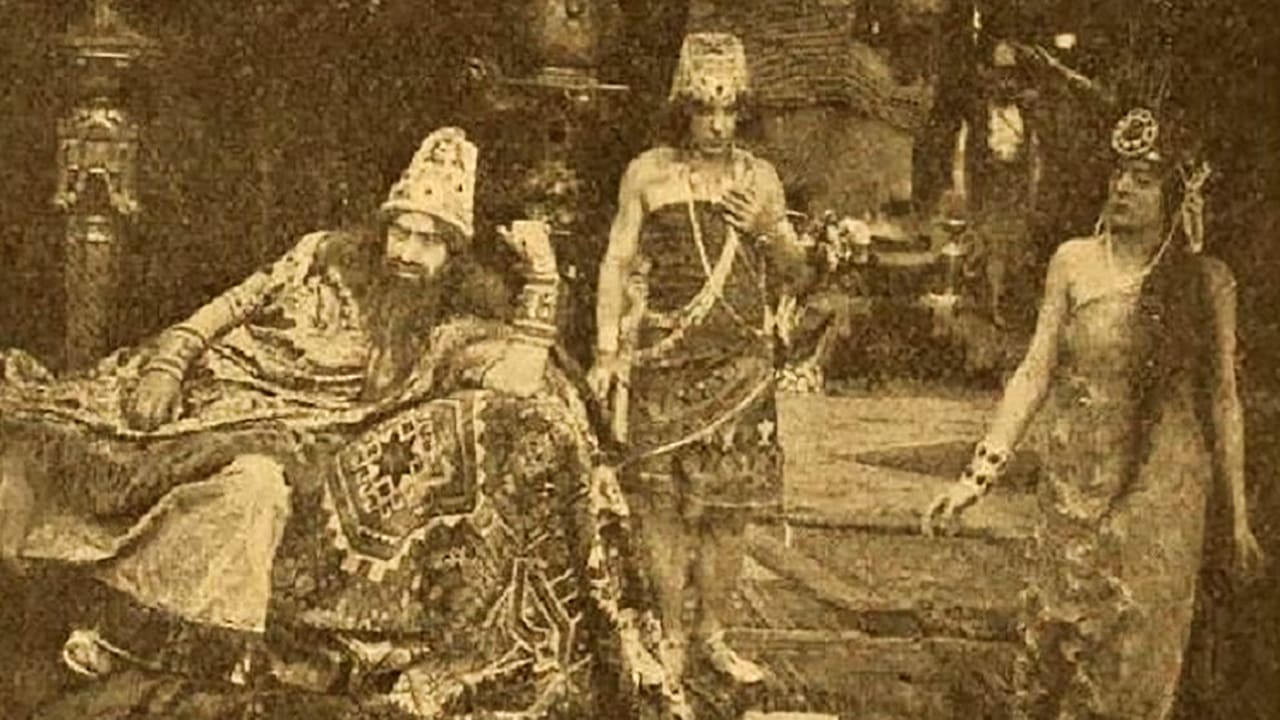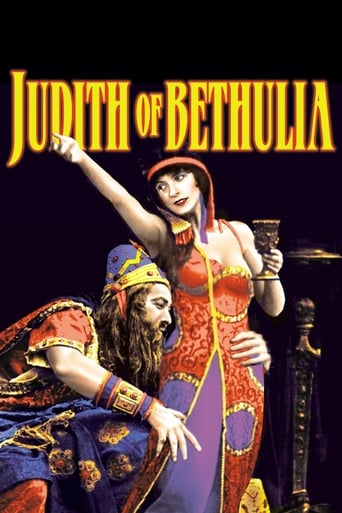Matcollis
This Movie Can Only Be Described With One Word.
WillSushyMedia
This movie was so-so. It had it's moments, but wasn't the greatest.
Doomtomylo
a film so unique, intoxicating and bizarre that it not only demands another viewing, but is also forgivable as a satirical comedy where the jokes eventually take the back seat.
Kayden
This is a dark and sometimes deeply uncomfortable drama
MartinHafer
"Judith of Bethulia" was one of the first great full-length epics. While the Italian film, "Cabiria", came out later in 1914 and was much longer and much better, "Judith" did debut first--and no doubt its success led to director D.W. Griffith making his next great epic "The Birth of a Nation".The story is from the Apocrypha and apparently there was also a play about Judith as well--and Griffith crafted his story based on both. As far as the historical accuracy of the story goes, it's got some plot holes and inaccuracies but it makes for a nice story.The film begins with the Assyrians under General Holofernes (Henry Walthall--though he's difficult to see under that giant beard) attack the most likely fictional town of Bethulia. The Jews' faith wavers, but the fair widow, Judith (Blanche Sweet), has faith that God will deliver the city from the Assyrian army. When God doesn't act, Judith takes matters into her own hands--and disguises herself as one of Holofernes' strumpets (he has a lot and never actually seems to do much of anything but party). Eventually, Judith finds him drunk and whacks off his head and presents it to her people. The Assyrians in turn run like babies.So what's to like? The film looks amazing for 1914. The costumes, sets and the look of the film are a HUGE step forward for the film industry and it looks great. It also helped that the actors were quite distinguished and tended to act in a reasonable and restrained manner (for the most part). The only serious negatives are the language in the film (it's very old fashioned and occasionally silly) and that the film is occasionally heavy-handed. A very good film overall.
Michael_Elliott
Judith of Bethulia (1914) *** (out of 4) D.W. Griffith's first feature as well as his final film for the Biograph company. Semi historical story from the Old Testament about Judith (Blanche Sweet), a strong willed woman who rises up to defend her town of Bethulia against Holofernes (Henry B. Walthall) and the Assyrians. Griffith was the first to take film-making to Los Angeles and that's how he got away with this film when Biograph refused to let him make longer running films. Griffith told the company he was going back out West so that he could film in better weather. The studio was under the impression that he was going to make six short films but instead he spent $36,000 (nearly five times the cost of a normal picture) and created his first feature. Even though the film became a huge hit, Biograph still refused to let him make features so Griffith left the studio, taking the majority of their actors with him and the rest is history. Needless to say but Biograph didn't last much longer. As for the actual film, it's a pretty good telling of events but for some reason that beautiful editing of Griffith's isn't to be seen here, which is a shame because it probably would have helped the film a lot. I think it would have also helped had he inserted more title cards but it's clear Griffith's mind was on the technical side of the epic battle scenes. The battle scenes here are very good and quite a treasure for the eyes. There's one scene where the Assyrians are trying to break down the gate leading into Bethulia and this here is where the greatest action is. People are on top of the gate throwing down large rocks, which was all done for real. Griffith paid the actors an extra $5 a day to let these rocks be thrown at them. The performance from Sweet is exceptionally good and the supporting cast also includes Mae Marsh, Lillian Gish, Dorothy Gish, Harry Carey and Robert Harron.
drednm
The first feature-length film from DW Griffith, JUDITH OF BETHULIA tells the story of a young widow who saves her city (Bethulia) from the Assyrians by an act of treachery.It's a warm-up for Griffith's masterpiece, INTOLERANCE, a few years later but still has merit of its own despite hammy acting and lackluster sets.Blanche Sweet (then 18) stars as Judith and is very pretty but the acting style (it is 1914 after all) is still crude with waving arms and long dramatic poses. Henry B. Walthall is the head of the Assyrian army, Mae Marsh and Robert Harron play the young lovers, Lillian Gish is a young mother, Dorothy Gish is a young cripple, Kate Bruce is the loyal maid, Harry Carey is the traitor.The extras (in heavy makeup) include Lionel Barrymore, Antonio Moreno, Elmo Lincoln, Mary Gish (mother of the stars), and someone named J. Jiquel Lanoe who is quite excellent as the head eunuch.Certainly worth a look but this seems very amateurish compared to what was coming. The film is also famous for going well over budget and getting Griffith fired from Biograph Studio.
rsoonsa
D.W. Griffith fuses Thomas Bailey Aldrich's long poem of Judith's story with its basis in the Apocrypha to derive this somewhat austere and powerful film of the widow's noble sacrifice to save her besieged city and its inhabitants from an invading Assyrian army, led by Holofernes. With JUDITH as Griffith's first feature length effort, he turns away from the commercial needs of the Biograph Company, the management of which desires to maintain its policy of making only one and two reelers, and his expenditure of $36000 is double the amount budgeted, reflecting his expanded use of sets and extras and providing the requisite exercise in preparation for his next major work: BIRTH OF A NATION, made as a free agent. Eighteen year old Blanche Sweet's performance is striking as she utilizes all of her wide range of expressivity, uncommon in one so young, to mirror the emotions of a woman who is physically attracted to a man, Henry Walthall as Holofernes, toward whom her only possible final act will be his death by her hand, as depicted in many a well-known painting. The supporting cast serves the sparsely titled production well, with emotional performances from Mae Marsh and Robert Harron as endangered lovers, and among the many bit players who animate the work may be seen Lionel Barrymore, Harry Carey, Antonio Moreno and Lillian and Dorothy Gish as victims of the invaders. This version is the four reeler rather than the one of six reels released later and is Griffith's answer to the full-length epics which were being imported from Europe; its release was delayed a year by Biograph to ensure that the director had left its employ, but this brought scant gain to the company: Biograph was soon defunct, while Griffith's star was rising.

